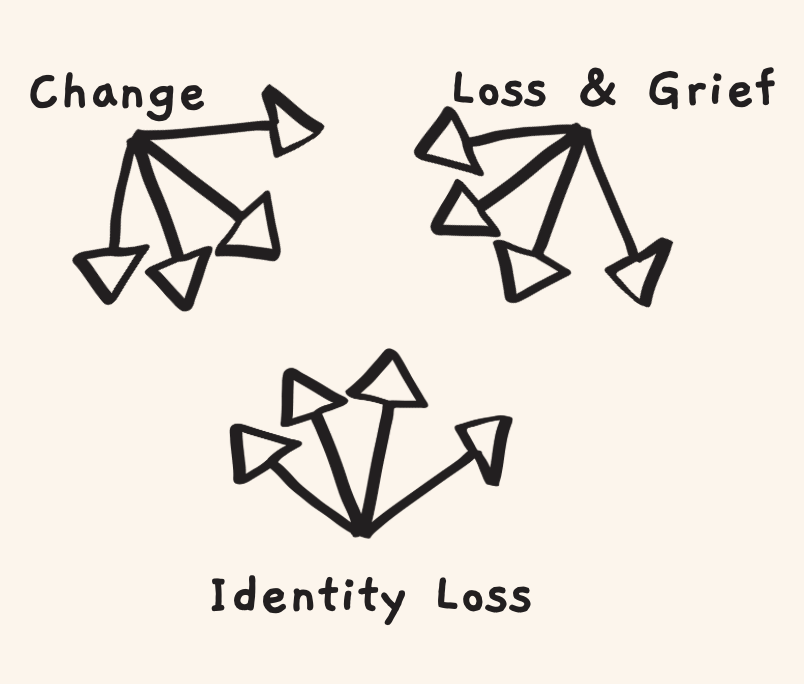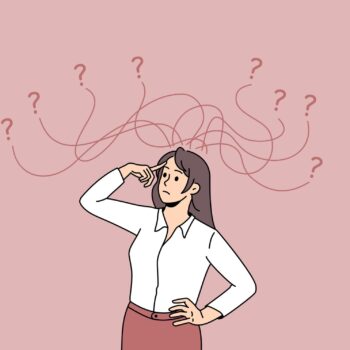Change, Identity Loss, and Grief
/ Understanding Grief : Eleanor Haley
For further articles on these topics:
Life is constantly changing, sometimes subtly and slowly, and sometimes on a seismic scale. As the world around us evolves, our thoughts and feelings shift. And as our thoughts and feelings change, so do the ways we relate to the world. Around and around it goes.
I think, therefore I am.
I am, therefore I think.
Though we often think of 'who we are' as being fixed, our identities grow and evolve in the same way our physical selves are ever changing. We live with ourselves 24/7, so we don't always see how the change because it's subtle and slow. Though these changes can give us pause when we take a step back and look at them, they don't strike us at the moment because they are incremental and we can easily accommodate and adjust to them.
For example, when I look at pictures of myself from 10 years ago, I may think, "wow, when did I get so old?" but I'm able to look at myself in the mirror on a day-to-day basis without hurdling myself into an existential crisis.
But sometimes, life changes are significant enough to cause drastic shifts, like becoming a parent, losing a loved one, getting sober, getting a diagnosis, and the list goes on. These changes can shatter your sense of self and create a web of loss that quickly splinters in and around you.
In the past, we've specifically outlined what identity loss is and how it relates to grief in our article I Don't Know Who I am Anymore: Grief and Loss of Identity. Today, we're going to continue exploring the topic by looking at the intersections between change, grief, and identity loss. These concepts intertwined because each can be the cause or effect of the other.

Change, Identity Loss, and Grief: 8 Considerations
1. Change for the better still causes grief.
It's important to note, even desperately wanted or needed changes (like getting out of a toxic relationship or making a healthy lifestyle changes) can cause loss. When changes are net-positive, people are often ashamed to admit they are anything but grateful. But we'll remind you, time and again, our experiences are complex, and people can feel two things at once. So even if you feel you've changed for the better and you love your life, you can still grieve what you had to change or give up to get where you are.
2. Change makes you feel out of control.
Sometimes change is due to external forces out of your control—for example, someone else making a big decision that impacts you or getting laid off of a job. Changes such as these can cause identity loss related to your sense of self-efficacy and confidence. Whereas you felt you were in the driver's seat of your life before experiencing the change, you now may feel ineffective, incapable, and powerless.
3. Changing your life and identity sometimes means losing your friends.
Sometimes the people you surround yourself with are the people who share a similar lifestyle to yours. And when your life changes, you may suddenly find that you have little in common with some people. As a result, you may make the sad but healthy decision to stop hanging around certain friends. On the other hand, people you thought your were your friends with may decide to stop hanging out with you, possibly leading to feelings of rejection and abandonment.
An example of this is when someone quits drinking. In many instances, the sober person will have to stop hanging around their old drinking buddies to protect their sobriety. But beyond this, they may find people stop inviting them places because (a) they only had drinking in common and (b) their friends are uncomfortable hanging around someone who's not drinking.
4. You feel misjudged and (mis)labeled.
Sometimes an identity loss or change can feel a little more ambiguous. Something significant has happened that's impacted how you think and relate to the world, but you are also still the same in many ways. You know all your nuances, but most other people don't, so they may label and make assumptions. For example, someone with cancer might only view them as a sick person. Or a new mother might feel her boss now sees her as less capable and focused.
5. People keep expecting you to be who you were.
Somewhere towards the other end of the spectrum is the struggle of feeling defined by who you were before you experienced a change in identity. People who knew you before may have a difficult time accepting that you're different. While you're just trying to adjust to your life as the person you are now, they continue to treat you like you're the person you were before. For example, people grieving the death of a loved one often say they feel friends and family are waiting for them to go back to "normal." In reality, they have changed and will never be the person they were before their loss.
In these instances, it may be helpful to step back and ask yourself:
- Does the person know that I've changed?
- Have I shared with them how their behavior makes me feel?
- Are they doing their best but struggling to get used to a change that I've had longer to adjust to?
- Are they intentionally ignoring how I've changed despite knowing how I feel?
- Do they know their behavior makes me uncomfortable, but they continue to do it anyway?
If your answer to the last two questions is "yes," check out our article on grief support gone wrong.
6. You struggle to find people who connect with who you are today.
It can be hard to make friends and connections as adults. So many people simply want a person or people who "get" them. And when you've gone through a significant identity-changing event, it can take a while to feel like people see you for you again (if they ever did). Sometimes it can help to deliberately seek out people who've been through the same experience you have. And it always helps to keep an open mind about people because you never know who you might connect with.
7. You miss the "before-you" sometimes.
Whether you're happy in your life or not, it's okay to miss your life and who you were before. Maybe you miss how you used to be able to run an 8-minute mile, or perhaps you saw the world as safer and more carefree place when you were younger. Of course, there are things you will grieve about yourself and your past life; it's only human.
The one thing we'll caution you against is negatively comparing yourself to the "before-you." It's not fair to compare the person you are now to an idealized version of the past. If you haven't noticed by now, loss is inherent in change. And living authentically can require an immense amount of courage and vulnerability. So, of course, the new you comes with its challenges and hardships. But that doesn't make the 'you' you are today any worse than who you were before.
8. You know who you aren't, but not who you are.
A common but complex experience is simply feeling that you don't know who you are anymore. Change has forced you to shed pieces of yourself that you may have once thought were integral to who you are. Now you realize these pieces don't fit, but what does? And where do you fit? When you consider how much of your young adult life and beyond goes into constructing an identity, you realize what a difficult task rediscovering yourself can be. So, again, we recommend reading our article Grief and Loss of Identity. Also, the below activity may also help anyone who has a few minutes to scroll through the simple steps.

We invite you to share your experiences, questions, and resource suggestions with the WYG community in the discussion section below.
We wrote a book!
After writing online articles for What’s Your Grief
for over a decade, we finally wrote a tangible,
real-life book!
What’s Your Grief? Lists to Help you Through Any Loss is for people experiencing any type of loss. This book discusses some of the most common grief experiences and breaks down psychological concepts to help you understand your thoughts and emotions. It also shares useful coping tools, and helps the reader reflect on their unique relationship with grief and loss.
You can find What’s Your Grief? Lists to Help you Through Any Loss wherever you buy books:










Jennifer October 24, 2022 at 4:18 pm
I have spent the better part of fifteen years being a perpetual caregiver. First it was my ailing father, then shortly after my sister, and finally the only man I ever loved.
It’s been 5 years. They are all gone, and I am still here. Still here missing them and missing the me I used to be.
It’s okay to not be okay – a reflection on the Pandemic Grief Processing Group – Women's Center at UMBC May 18, 2022 at 10:00 am
[…] Activity: Who am I now? […]
Debra A April 15, 2022 at 6:07 pm
I just lost my 2nd child. I never even reached acceptance with the 1st death. My anger is out of control and I find myself apologizing all the time I am a completely broken. I just want to be with my children. That comment got me admitted to psych ward on suicide watch. Isn’t that how any parent would feel. I lost my family my very soul
Litsa July 16, 2022 at 11:43 pm
I am so sorry, Debra. Please know that ‘acceptance’ is very much misunderstood in grief. We grieve forever in some way and it is always about learning how to live with grief. I am so sorry that expressing thoughts of suicide led to being hospitalized. I hope that you were able to get connected to counseling for support, as it can be incredibly helpful.
Jennifer April 16, 2023 at 4:08 am
My prayers go out for you. My biggest fear now is losing my 2nd child. I hope you have found the support you need. I know how utterly impossible it is to be understood and truly supported but I sincerely hope you found it. 😢
Barbara Stratton November 10, 2021 at 6:18 pm
I have experienced cumulative grief after losing my mother, and then my husband back to back in 2017. My boyfriend, best friend, and confidante died suddenly two months ago after three years together. Even if we weren’t married, it still hurts nonetheless. A single girl that knew both of us treated me to a nice meal, stayed with me for a couple of days at my request since I was afraid to be alone at first. Well, after that she just quit replying to my texts and fell off the radar, which really hurt me to the core. My best friend since high school days has always been there for me. If it hadn’t been for her I’d hate to think what would have happened to me. I have no children because I was unfortunately unable to have any, and God knows I wanted a quiver full of them! I am an only child since it was difficult for my mother to carry a baby to term. I feel totally alien like I don’t even know myself anymore. The loneliness is unbearable. At least my job kept me busy at first, but as of late half my work has dried up. I need something to keep my mind off the death at least part of the day. I am staying with my deceased boyfriend’s sister now, but things are compounded by too many changes at once. I cannot continue to stay here rent free, even though her house is paid for. I share half the utilities and clean her house, let her dogs out, do all the dishes, but I am feeling badly about needing another job, and have been continually on the lookout for another job. It’s been really rough crying every single day for two months. I’m just wondering how to deal with everything going on at once. I’ve been a workaholic up until now. Even when I get another job I don’t have the energy to work 12 hrs a day 6 days a week anymore. I’ve got to leave here by the end of the year,. and I’m feeling the squeeze of immense pressure.
Giselle November 4, 2021 at 6:34 pm
I lost my son in law from sepsis 6 years ago
Leaving my daughter with small children
To bring up alone.
I loved him like my own son and developed ptsd following his death ( I already had anxiety disorder)
I have had cbt and all kinds of treatment but I still suffer.
Now my husband says he has to leave because Im a changed person and that I have neglected him for the past 6 years.
That’s this death has destroyed our marriage because I didn’t handle it properly.
Maybe he’s right .?
I worst thing is I don’t care if he leaves
I feel it is one less person to need me .
Jennifer April 16, 2023 at 4:05 am
I know it has been a couple of years since your post and you will probably never see this but my heart goes out to you! I hope things are better for you now.
Andrea November 2, 2021 at 6:34 am
This place is amazing. I love it. Thank you for all you do in helping other people to understand themselves and finding meaning when you do not know who we are anymore and how to start all over again when the world you used to live changed forever. When our future expectations changes forever. Great site and articles.
Litsa November 2, 2021 at 11:16 am
Thank you so much for the kind words, Andrea. Glad you have found some support here!
Shannon M Rowland October 27, 2021 at 5:40 pm
I honestly do not know if what I experience is ambiguous grief or not.
I left a cult and was completely shunned by everyone I knew including my own father. My two daughters then quit speaking to me when each reached the age of 18.
Having two girls, especially after my own mother suicided when I was 8, was a blessing and joy like none other.
They are now 30 and my younger one is 25 and the mother of two little girls of her own. Babygirls I will probably never get to meet because of there belief system.
I am single, lost both siblings and have no cousins, aunts or uncles and it just me and my 18 year old son who hates what my sisters have done to me. But, I also can’t talk about it much because when I do get to see him from time to time I try to concentrate on happy things.
That is a little bit of my story……would you consider this ambiguous grief?
I am just really struggling to make any meaningful life for myself and want to be busy like all my other friends getting to proudly show off their grandchildren. Also I live alone and it gets very lonely on top of it all.
Andrea November 2, 2021 at 6:31 am
I really know how you are feeling. In my case I have no relatives and I used to work in a cruise ship and come home twice a year for 2 months vacation. My family are my father and my mother who are elderly and my only friend and sister passed away last year. She was the one to help me to take care of my parents and my companion in everything. Now I have to quit my job and take care of my parents. I don’t like where I live as there is no job opportunities. I have nobody and my only two friends stop seeing me as I am not the same. I do not recognize myself anymore. It hurts so badly. It has being a tough year and I do not know who I am. But either I face this sad reality or I die. And in honor of my sister who was courageous even when she was sick I choose to continue. So even if you are sad try to go to a place you can meet people I started going to budism temple and their life philosophy is down to earth. I am living one day at a time. I am very sad but I push myself to go out even alone. Bookstores, movies, as places are opening now. And it helps. I feel very lonely but we have to move foward. Read the book of Victor Frankl about his experience on the concentration camp. He resist all the tragedies and found meaning in life. Believe in something. Hope is the only thing that help us to go on. Good luck.
Carm Russell October 15, 2021 at 2:03 pm
It has been over 7 yrs since I lost my husband. And I thought WYG gals had pretty much shared and said all I needed. But this article helps me where I am at right now. Especially #3 & #5. Thank you thank you thank!